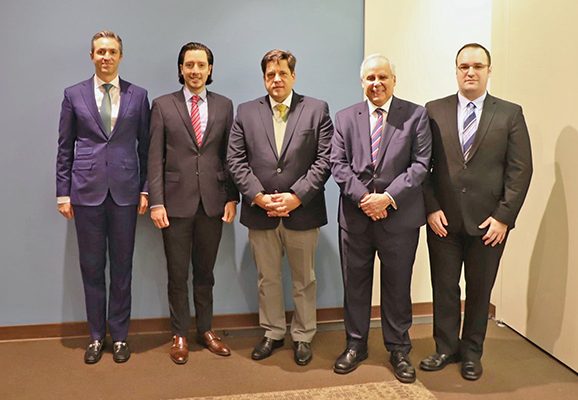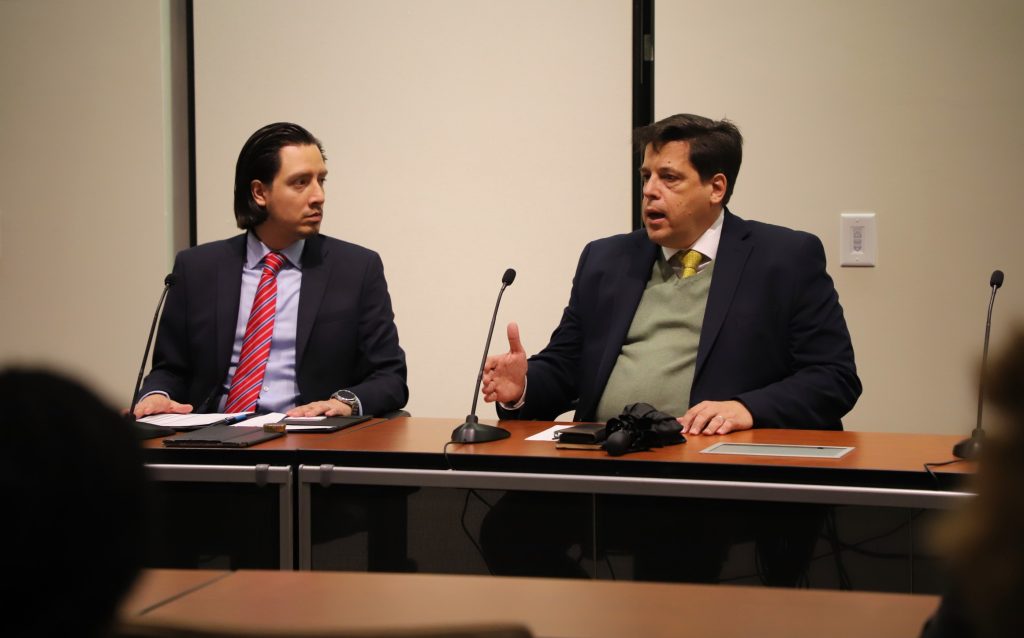Vance Center Continues Judicial Independence Series with Conversation on the New York and Mexican Judiciary
May 2024The panel was the second part of a series of conversations co-organized with the Mexican Bar Association (Barra Mexicana de Abogados) focused on the country's rule of law and judicial independence context, this time bringing in expert perspectives from New York and Mexico's judiciary.

Pictured (from left): Diego Sierra Laris, Jaime Chávez Alor, Justice Gutiérrez Ortiz Mena, Justice Belen, and Michael Fernandez. Photo credit: Vance Center
On May 15, the Vance Center and the Mexican Bar Association (Barra Mexicana de Abogados) brought together two distinguished judicial actors, Hon. Alfredo Gutiérrez Ortiz Mena, of Mexico’s Supreme Court of Justice and Hon. Ariel E Belen, retired Associate Justice of the Appellate Division, Second Department of the Supreme Court of the State of New York, for a timely discussion surrounding judicial independence.
Over the hourlong conversation, the two judges outlined the parallels and contrasts between the Mexican and U.S. justice systems, identifying strengths that uphold independence as well as points of weakness that have left the systems vulnerable to manipulation and incremental attacks. They highlighted the need for the international community to speak up in scenarios when the rule of law is threatened and compromised, especially when judges cannot and do to do in ways that resonate with ordinary citizens.
The event began with an introduction from Michael Fernandez, Member at Cozen O’Connor, and Diego Sierra Laris, Partner at Von Wobeser y Sierra and Counselor of the Mexican Bar Association, who set the backdrop for areas of concern when thinking about judicial independence in both New York City and Mexico. Fernandez emphasized the role that justice conducted abroad, in Latin America and beyond, has on U.S. interests, making New York City’s extensive business ecosystem a critical juncture to examine the impact of domestic and international judicial constraints on executive authority and legislative powers. Sierra Laris echoed these sentiments, saying that “judicial independence does not escape jurisdictions regardless of the country,” and highlighted the collaboration between the New York City Bar Association and Mexican Bar Association as a critical effort to raise awareness around complex judicial independence challenges in both countries.
Justice Gutiérrez Ortiz Mena opened by contextualizing Mexico’s democratic transformations and the impact of drastic constitutional and Supreme Court changes over the past 30 years on human rights and civil liberties, including a substantial expansion of the judiciary’s responsibility. He highlighted how a key 2011 amendment of Article 1 in the Mexican Constitution led the Supreme Court to consider constitutional rights on issues involving structural inequalities and discrimination, as highlighted by monumental rulings on same-sex marriage in Oaxaca and abortion. After outlining how changes in the Mexican Constitution and the Supreme Court’s powers have led to significant progress on human rights and civil liberties, Justice Gutiérrez Ortiz Mena noted that eroding judicial independence puts this progress at risk – a timely warning ahead of the country’s upcoming federal elections in June.
Moving to the domestic context, moderator Jaime Chávez Alor, the Vance Center’s associate executive director, observed that judges in Latin America often think independence is “set in stone” in the U.S., but in reality, it has also come under threat in recent years. Justice Belen emphasized that everyone loses when the foundational principle that “no one is above the law” is compromised, and that attacks on judicial independence often happen incrementally in democracies. He cited minoritarian rule as a problematic strategy used in the U.S., enabling disproportionate power through processes like the Electoral College, gerrymandering, campaign financing, the Senate’s power-sharing arrangements, and Supreme Court appointments. Justice Belen warned that these pervasive strategies, when carried out with impunity, have led to a very politicized Supreme Court, with Justices making decisions that align with political goals, rather than independent, objective interpretation of the Constitution. He highlighted the Supreme Court’s decision in Shelby County v Holder as an example of how the U.S. court’s administration facilitates a Justice’s ability to impart their individual beliefs, which compromised civil liberties overnight, while the Mexican structure protects these matters.
Focusing on conditions to guarantee judicial independence, Chávez Alor asked about withstanding political pressures through the process of electing judges, contrasting the process in Mexico, where the president does not have to justify the selection of particular judges, with other countries in the region that do require some form of justification. Justice Gutiérrez Ortiz Mena distinguished the process for appointing federal Supreme Court judges from that for district and circuit courts. For the former, the Senate appoints judges based on the president’s suggestion, and must act within a 30-day window; a stark contrast from the U.S., where the process is reversed, allowing the Senate to take strategic advantage of appointment timeframes. Justice Gutiérrez Ortiz Mena called Mexico’s rigorous and strict merit-based system for district and circuit court appointments the “bedrock of the independent judiciary.”
Following mentions of Mexican President López Obrador’s controversial efforts to reform the judiciary, Chávez Alor asked what the international community can do to support judicial independence in countries at risk for political parties taking control of processes to appoint judges, citing Bolivia as an example. Justice Gutiérrez Ortiz Mena emphasized that international actors, including NGOs, think tanks, and legal associations, are able to talk publicly about difficult judicial issues and risks in ways that judges cannot, and to make them accessible for “the everyday person” to understand. Justice Belen echoed this sentiment and raised a compelling challenge on public perception of justice systems, positing that the average person likely thinks they won’t have a “fair shot” in front of a judge in many parts of the world, though this may be somewhat less widespread in the U.S. Chavez Alor concluded the discussion observing that supporting efforts to defend judicial independence is as important for judges, when they speak up against attacks on democracy, as it is for individuals, who hope to encounter a fair, independent judge if they ever find themselves in court.



